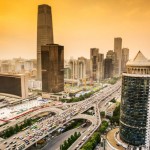
As one of China’s six ancient cities, Beijing displays an incredible historical panorama. For centuries the city was considered the heart and soul of China, and that has not much changed in modern day Beijing.
Today, this home to the world-wide famous Great Wall is the capital of the People’s Republic Of China, and the nation’s economic, cultural and political center. Beijing city’s unparalleled ancient history and modern day excellence have made it into one of the world’s most visited destinations, attracting millions of tourists and business travelers alike. If you happen to be one of them, our Beijing city guide will ensure that you are prepared before making your trip to one of the world’s most popular cities.
The list of things that make Beijing a special place is almost endless. Popular sights of the Forbidden City, filled with landmarks from the Ming and Qing dynasties, worldwide favorites, like the Great Wall of China, the Summer Palace and Hutong, will surely leave you speechless. For business travelers, the enormous thriving economy of Beijing city is an obvious draw. As the capital city of the world’s most populous nation, there is a seemingly unlimited number of business opportunities to immerse yourself in.
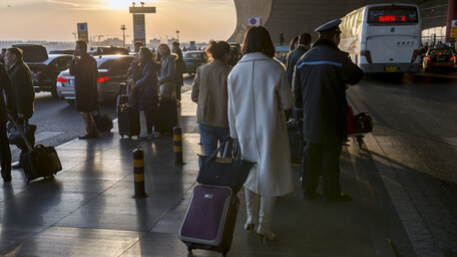
Beijing is China’s second most populous city, with around 21 million people calling it home. With this amount of people residing in Beijing, and millions of tourists that visit each year, the city is a crowded place. That means that the public transport networks are likely to be busy at most times of the day.
Getting from the airport to your hotel or office is not as easy as it would be in western cities. Whilst the idea of calling a taxi as soon as you step foot outside the arrival hall may sound like the most convenient option, that’s often not the case. Taxi drivers in big cities like Beijing often avoid picking up foreign passengers, citing the language barrier as too great an obstacle to overcome. Foreigners using taxis are also subject to a number of scams by unlicensed, and sometimes even regular taxi drivers . If you plan on using a taxi it’s good to do the following:
If taking a taxi seems like too much of a hassle and stress, arranging your Beijing airport transfer with a reputable car service is a far better option. Flexible arrangements that accommodate flight delays, and safe and reliable vehicles with English speaking drivers, is what most experienced travelers through Beijing chose to make use. This hassle-free transport on offer is by far the most expeditious and comfortable way for Beijing airport transfer, available 24 hours a day.
If you plan on avoiding the roads altogether, the airport express train is also a viable option. The express train departs from terminals 2 and 3 between 6:30 AM and 11:00 PM each day and runs directly into the Sanyuanqiao districts, where you can find a taxi or get a car service to your final destination.
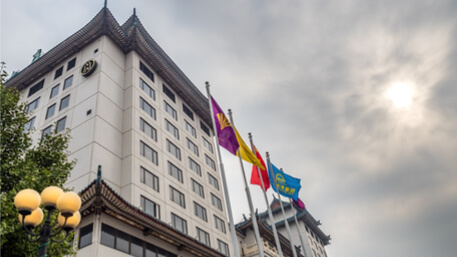
With public transport options often being overcrowded and a hassle to use on a business trip, staying close to your office or an area of interest can save valuable time. The Chaoyang district is widely regarded as the biggest, and busiest CBD of Beijing city. It is filled with big brand names and high-end hotels located close to the financial districts. If you consider to stay in this area the best hotels on offer are:
Westin has everything you would expect from a big name 5-star hotel in a major city. With all the usual luxury comforts in each room and high-speed internet throughout, there is little wonder why it’s a popular choice.
Perks for business travelers: The business facilities on offer are located near the lobby. There are workstations, meeting rooms and conference facilities which provide every office comfort you would expect. The executive lounge on level 34 is very well known as a great place to host an after-work meeting or to unwind with a drink.
TripAdvisor rating: Over 1200 views prove that the Westin is consistently great at 4.5/5.
Another centrally located five-star offering, where the staff is renowned for going the extra mile. With a beautiful setting in central Beijing, and surrounded by some of the region’s most sought-after restaurants, the Sofitel offers 5-star comfort on the doorstep of cultural Beijing.
Perks for business travelers: There are plenty of great restaurants nearby which are frequented by both business and leisure travelers. The hotel is equipped with high-speed internet making it easy to get work done from the comfort of one’s room. On top of that, the hotel offers a popular conference center, which offers work pods in its lobby when needed.
Tripadvisor rating: Over 1500 reviewers consider the Sofitel Wanda to be a great stay with an average 4.5/5 rating.
There is probably no surprise in knowing that one of the world’s biggest luxury hotel brands is present in Beijing. The hotel is centrally located with amenities including spas and incredible restaurants, as well as beautiful and comfortable rooms with stunning views.
Perks for business travelers: Whilst a number of their high-end counterparts also offer business facilities, the Ritz Carlton is popular for the secretarial and full office suites it offers for its business guests. Every amenity you can think of is offered.
Tripadvisor rating: Over 1000 reviews later and the Ritz is still rated at an average of 4.5/5.
Are you planning on visiting Beijing city soon? A private transfer is the safest, quickest way to travel from the airport to the city. China Car Service is a trusted transportation service helping business travelers for almost two decades. We provide door-to-door service at competitive prices.Make your journey stress-free and contact our 24/7 team at Bookings@ChinaCarService.com with questions, or get a quote below. Use this promo code: 10CARBLOG to get a $10 discount on your 1st service. |
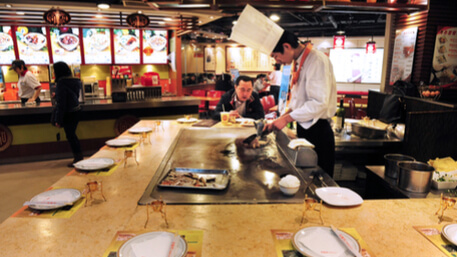 Much of Chinese culture revolves around the exquisite food. Beijing is a true representation of just that. With hundreds of incredible restaurants on offer boasting the best of local cuisine and international favorites, conducting business meetings over lunch or dinner is a common practice in Beijing city for good reason! If you’re looking to meet your clients over a meal, the most recommended restaurants are:
Much of Chinese culture revolves around the exquisite food. Beijing is a true representation of just that. With hundreds of incredible restaurants on offer boasting the best of local cuisine and international favorites, conducting business meetings over lunch or dinner is a common practice in Beijing city for good reason! If you’re looking to meet your clients over a meal, the most recommended restaurants are:
Located in the heart of the Chaoyang district, home to most of Beijing’s biggest companies, Mosto is popular venue amongst business travelers. The European themed dishes include a Cantonese flair that never disappoints. With private dining booths on offer, Mosto is well equipped for business meetings over lunch or dinner.
Recommended Dish: The lobster or goose liver risottos are regular favorites and sure to wow all the guests.
Tripadvisor rating: When browsing through the reviews, it’s hard to find a poor one. Rated at an average of 4.5/5.
Famed for its impeccable service and incredible meals, the French cuisine on offer at this Michelin star restaurant is on par with any restaurant you may find in London or New York.
Recommended Dish: There are so many to choose from but the beef fillet is possibly one of the best dishes you can find anywhere in Beijing!
Tripadvisor rating: It’s hard to fault the TRB Hutong and the reviews make that clear, with most reviews averaging 4.5/5.
If you’re in the mood for authentic Chinese cuisine prepared exceptionally well, Din Tai Fung is one of the best restaurants found anywhere in China. The private dining rooms are used every day by businessmen and women holding meetings and impressing their clients.
Recommended Dish: The pork dumplings are hard to resist and as good as you’ll find in China.
Tripadvisor rating: Another of Beijing’s finest where finding fault is hard, testament to that is it’s 4.5/5 rating on TripAdvisor.
Beijing is considered fairly safe for all visitors. Aside from the taxi drivers who often look to scam passengers out of extra money, the city in general is safe and well policed. It’s still advised to beware of pickpockets and thieves especially along public transport routes in trains or taxis who will happily remove your travel documents or wallet and phone without you even noticing.
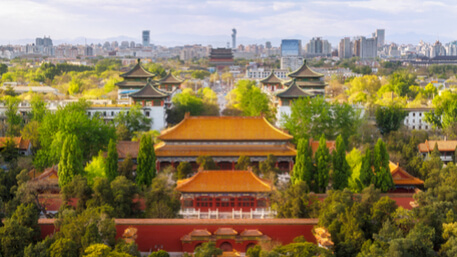 Beijing experiences a wide range of temperatures throughout the year. Summers are known to be hot and dry with the mercury often reaching 40°C, while Winter can be just as difficult to manage at nearly -20°C at its worst. The best time to travel to Beijing, or most of mainland China really, is during the Spring and Autumn seasons.
Beijing experiences a wide range of temperatures throughout the year. Summers are known to be hot and dry with the mercury often reaching 40°C, while Winter can be just as difficult to manage at nearly -20°C at its worst. The best time to travel to Beijing, or most of mainland China really, is during the Spring and Autumn seasons.
Whether you’re visiting Beijing city or any other mainland Chinese city, getting a working and reliable VPN is a must. Beijing is not only home to the great wall of China, but also the great firewall. To access most famous Western applications like Gmail, Facebook, Skype, etc. you’ll need to connect to a VPN before getting access.
The other essential app to carry on your phone when in China is WeChat. Available on both iOS and Android, WeChat has become an integral part of everyday Chinese life. Along the years this app has gone from being used as just an instant messaging platform, to being used for business purposes as well. Mobile payments and document transfers are just a few of its many useful features.
If you find this blog useful, please feel free to share it! Have you been to Beijing city recently? What tips or comments could you share with people hoping to do the same? Feel free to leave your comments below!

With a history that dates back as far as three millennia, Beijing is one of the oldest capital cities anywhere in the world. Known as a bustling and often chaotic metropolis, and the last of China’s four great ancient capitals, Beijing attracts millions of business travelers and those visiting China for a holiday. Being the economic and transport hub of Northern China, many visitors use the city’s airport as a pit stop along their way to neighboring cities like Tianjin. Getting between the two cities, however, can be more complicated than just hopping inside of a taxi. If you’re planning on making the trip, here are the 3 best ways to get from Beijing airport to Tianjin.

Most of China’s major cities are connected by long distance bus routes especially popular amongst locals traveling around the country. The Beijing to Tianjin route is no different. With a valid ID or passport, you’ll be able to purchase a ticket at any of the ticket stations within the departure halls of Terminal 1 and 3 within the airport. Whilst the bus route might be the most direct way of getting from one city to the other, it’s by no means easy nor fast.
Beijing is a hugely populated city. With ticket prices being aimed at the local market, you’re likely to be queuing for some time to get a ticket and to reserve your seat on the bus. While certain areas in China don’t offer air-conditioned buses, departing from a major city like Beijing, it is likely your bus will have a working air con. For business travelers flying halfway across the world to reach Tianjin, hopping on a 2 and a half hour long ride, in an often crowded and noisy bus, is hardly recommended. The bus stations in Tianjin are located throughout the CBD but are unlikely to be close to your hotels or office. Meaning you’ll either have to walk the remaining distance or find a taxi to get you to your final destination.
A private airport transfer is the safest, quickest way to get from Beijing to Tianjin. China Car Service is a trusted transportation service helping business travelers to China for almost two decades. We provide door-to-door service at competitive prices.Make your journey stress-free and contact our 24/7 team at Bookings@ChinaCarService.com with questions, or get a quote below. Use this promo code: 10CARBLOG to get a $10 discount on your 1st service. |
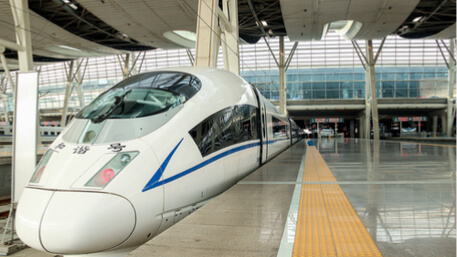
There are a few public transport options as impressive as China’s high-speed train networks. China truly has an advanced and modern high-speed railway with remarkable high-speed trains making the train travels as fast and comfortable as ever.
Trains departing from major cities like Beijing or Shanghai can reach speeds of up to 400 km/h, with mostly non-smoking and surprisingly clean carriages.
Using a high-speed train can be less of a hassle than hopping on a domestic flight in China. Depending on which cities you’re traveling between, it can also be one of the quicker options. A flight from Hangzhou to Beijing, for example, takes about 2.5 hours whilst the train journey between the two cities lasts for only 5. However, when you consider the time spent at the airport doing check-in, dropping off your baggage, boarding and the very high possibility of flight delays, taking the train ends up being faster. As a business traveler, the trains can also offer much more space and comfort if you are wanting to get some work done during your journey.
The high-speed trains between Beijing and Tianjin depart from the Beijing South Railway Station, meaning you’ll have to take a taxi or an airport shuttle bus to get there (line 10 leaves the airport and heads straight for the Beijing South Bus Station). The journey between the two cities lasts around half an hour.
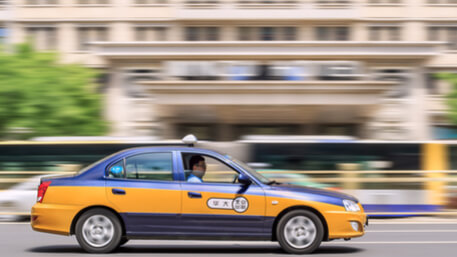
Most Western travelers believe using taxis in China to be as easy as it would back home. Sadly though, that’s not always the case. While taxis are not difficult to find in major cities like Beijing, a number of drivers refuse to pick up foreigners due to the language barrier. If you do choose to take a taxi, it’s recommended to have your destination written down in Mandarin on a sheet of paper which you can show the driver. However, even that won’t guarantee the driver will get you to the right destination. It is pretty uncommon to see the taxi drivers in China use a GPS system, which means that in most cases they solely rely on their memory of all the street names and directions. Taxi scams in China are prevalent, as they are in many other countries, and avoiding them can be tricky to first-time visitors.
Definitely, the most comfortable and hassle-free option would be to hire a reliable car service. Having drivers who speak fluent English, are familiar with the route and are able to deliver you to your destination in safety and comfort removes possible stress and headaches often associated with getting around China. Many business travelers choose to hire a private car for their Beijing airport transfer and factory visits in Tianjin as it saves them a great amount of time and provides an easy and comfortable travel.

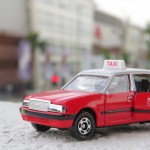
For first-time travelers and seasoned business professionals alike, traveling to China is an exciting experience. Whilst China has an incredible amount of beautiful landscapes and exciting modern cities to offer, traveling around town is often a difficult prospect. If you’re planning on using an airport taxi in China to get to your hotel or the office, here are a few things you should know when taking one:
Unless you’re fluent in Mandarin, it’s essential to have your hotel or office address written down in Chinese. The prospect of writing it down yourself doesn’t have to be as daunting as it sounds. Most large hotels in China have “taxi cards” where they will write down your destination for you, to hand over to your taxi driver. The same service can be found at most major airports from concierge or help desks usually found within the main terminals. If you’re unable to get a pre-printed taxi card, the staff at any of the help desks (who will almost certainly speak at least some English) will usually gladly write down your destination for you to hand over to your driver. This is generally a common practice, so don’t feel as though you’re asking for an uncommon favor.
Experienced travelers tip: If you cannot find someone to write down your destination before taking a cab ride, both Google Translate, and Google Maps can be used. These apps have a great offline feature you can download to your phone before your trip. They prove to be very useful when trying to communicate with taxi drivers in China.
Flagging an airport taxi in China down is usually fairly simple, at most of the major airports you will find yourself at the back of a queue waiting to jump inside one of the taxis parked outside. Flagging down a taxi outside the airport on a public road can be far more difficult. Whilst using a pre-arranged car service in China will offer you the convenience of not having to wait for a vehicle, patience is key if you choose to use an airport taxi in China. It’s not uncommon for others to compete with you for the taxi and jump ahead of you taking your place on the ride. Drivers are also known to drive straight past foreigners, seeming uninterested on occasions and often not willing to bother with passengers who can’t communicate easily. Beware of black taxis operating in different cities around China. Their vehicles may look the same as any other taxi but their tactics to overcharge foreigners can be confusing to those not aware of them.
Experienced travelers tip: Apps like Didi car rides have reduced the need for waving down taxis. The app now offers both Mandarin and English languages making it easy to use for both locals and expats. However, it is very likely the driver with give you a call right after you’ve booked your ride and ask for the exact pickup location. This might be difficult for expats who do not speak Mandarin and are not familiar with the streets in Chinese cities.
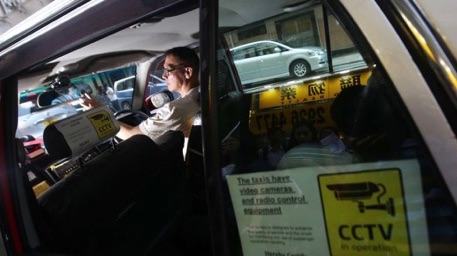 Just as New York’s famous yellow cabs differ from those driving around Los Angeles, taxis will differ depending on which major city you’re visiting in China. Generally, the taxis are in a standard condition. In many Chinese major cities, the back seats will be covered in white cloth. The problem with the cloth, though, is that it generally covers the seat belts in the back seat. With China’s roads being as chaotic as they are, it’s required by law to have your seatbelt on. Hence most locals decide to hop in front alongside the driver. Remember that all passengers are expected to enter a taxi from the passenger’s side. Even if sharing an airport taxi in China, it’s custom to enter on one side. In some taxi’s the rear door on the driver’s side doesn’t even open.
Just as New York’s famous yellow cabs differ from those driving around Los Angeles, taxis will differ depending on which major city you’re visiting in China. Generally, the taxis are in a standard condition. In many Chinese major cities, the back seats will be covered in white cloth. The problem with the cloth, though, is that it generally covers the seat belts in the back seat. With China’s roads being as chaotic as they are, it’s required by law to have your seatbelt on. Hence most locals decide to hop in front alongside the driver. Remember that all passengers are expected to enter a taxi from the passenger’s side. Even if sharing an airport taxi in China, it’s custom to enter on one side. In some taxi’s the rear door on the driver’s side doesn’t even open.
Experienced travelers tip: Taxi drivers in China will not expect you to speak fluently in Chinese or communicate with them throughout the journey. Generally, the drivers will keep to themselves and ignore you, unless you’re able to engage with them in conversation. If you’re familiar with Mandarin or have had time before your trip to research some local phrases, these can be put to good use with the driver. A friendly hello in Mandarin might make your trip a little more relaxed. It’s a good idea to either carry a sheet with common travel phrases in China or use an app that can translate for you. Finding a service that provides English speaking drivers is the best option because as with any foreign country, things will easily get lost in translation. Miscommunication is a hassle that most travelers wish to avoid.
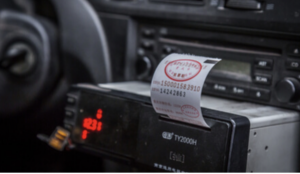 It’s always best to carry smaller bills when using a taxi in China. If you’ve just arrived in China and need to withdraw money from an ATM to pay for your taxi fare, it’s suggested asking a cashier within the airport to exchange your notes for smaller denominations. You can also purchase a small item of food or drink to leave you with enough change to pay your fare. Luckily you won’t need to bargain with the driver over your fare. Most taxis in China use a meter. If your taxi doesn’t use a meter, your driver is likely to try and convince you that your fare is far higher than it actually is. Rather stop your ride, get out and find another one.
It’s always best to carry smaller bills when using a taxi in China. If you’ve just arrived in China and need to withdraw money from an ATM to pay for your taxi fare, it’s suggested asking a cashier within the airport to exchange your notes for smaller denominations. You can also purchase a small item of food or drink to leave you with enough change to pay your fare. Luckily you won’t need to bargain with the driver over your fare. Most taxis in China use a meter. If your taxi doesn’t use a meter, your driver is likely to try and convince you that your fare is far higher than it actually is. Rather stop your ride, get out and find another one.
Tipping is not practiced in taxis in China. The drivers don’t expect to be tipped and will generally hand you back the extra cash thinking it’s your change. Once you have paid your fee, it’s best practice to wait for your receipt before getting out of the car. All receipts have the taxi’s number and details on it, so there can be no confusion as to how much is charged for the trip. It’s also useful if you accidently leave an item behind or have a serious complaint against the taxi you’ll have a central number to report it to and hopefully locate your missing items. If you’re traveling on business, you’ll also be able to claim back the amount of your fare from your company using the receipt.
Taxis in China are more complicated to use than what they are in many countries around the world. Catching a taxi ride, and explaining where to go, proves to be a difficult task for many. Those traveling for business and often being expected to follow a strict schedule are especially recommended not to take a taxi, as they tend to be highly unreliable.
If you’re looking to make your way from the hotel or office to another meeting or to the airport on business, using a safe and reliable car service eliminates the hassle and stress so often associated with Chinese taxis.

If you’re looking for cultural historic architecture and charm within China, Xiamen is the right place to be. The city is quickly emerging as one of southern China’s most sophisticated cities. All thanks to the lure of its European-like city infrastructure and architecture, as well as its charming seaside promenades and beautiful ocean views. It’s no wonder that Xiamen hotels are busy all year round, accommodating a lot of visitors from all around the world. Among its many visitors are business travelers looking to take advantage of its growing economic scene.
If you’re planning on visiting the city during your business trip, you can take a little over an hour long flight from any of the central hubs like Hong Kong. Once there, you might consider staying in one of these top 5 luxury Xiamen hotels:
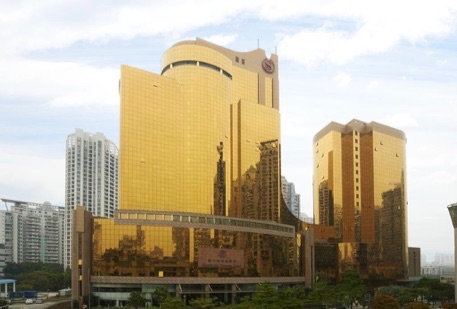
The name Sheraton is synonymous with luxury regardless of where you are in the world, and Sheraton Xiamen is no exception. Amenities are everything you would expect them to be, with each of the 360 rooms in the hotel equipped with WiFi, large flat screen TVs and the sort of premium linen that’ll guarantee a great night’s rest after a busy work day.
The Sheraton also offers a 24-hour health club with spas, saunas, and access to yoga and pilates classes available throughout the day. Perhaps most intriguing to those visiting on business will be the business center open 24 hours a day. Sheraton’s workstations provide high-speed WiFi, faxing machines and conference centers designed to provide its visitors with the comfort of staying connected, and on schedule even during the business trip.
Sheraton hotel is located a stone’s throw away from some of Xiamen’s most loved restaurants. If you’re not in the mood to venture outside of the hotel, the Olea Steak and Seafood restaurant within the hotel is open every night, serving some of Xiamen’s best western dishes. There is also the hotel’s poolside bar where you can unwind and enjoy a drink after a busy day.
The hotel is comfortably located in the center of Xiamen’s banking and financial district, and no more than 10 minutes away from the Xiamen international trade building.
Being located just a few blocks down the road from the S206 metro line it is easy to use public transport when staying at the Sheraton. Variety of great restaurants in this area attract many taxis near the hotel. Before hopping into one, it is good to get familiar with a few obstacles foreign visitors experience when using Chinese taxis . If you have a meeting or an event to attend, using a car service is the safest and easiest option.
Over 600 reviews have given the Sheraton an average of 4.5 on TripAdvisor, with the vast majority of reviews raving about the excellence of the hotel staff, rooms, and restaurant.
Preparing for a trip to Xiamen? A private transfer is the safest, quickest way to travel from the airport to the city. China Car Service is a trusted transportation service helping business travelers for almost two decades. We provide door-to-door service at competitive prices.Make your journey stress-free and contact our 24/7 team at Bookings@ChinaCarService.com with questions, or get a quote below. Use this promo code: 10CARBLOG to get a $10 discount on your 1st service. |
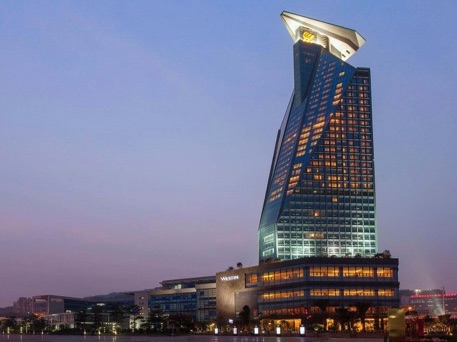
Another one of the big international hotel chains present in Xiamen is The Westin. Located just a mile from the cultural arts center, and two miles away from the central shopping districts of Xiamen, including the SM city, The Westin offers plenty of entertainment options for its guests.
The hotel provides every level of luxury you would expect from an exceptional hotel brand like Westin. With expansive views on offer from every room within the hotel, which all include free wifi and nifty iPod/iPhone docks to charge various devices, and so much more.
The incredible thing about the Westin is that there are 5 restaurants in the hotel alone! The restaurants include:
Seasonal Tastes: Perhaps the most prestigious restaurant anywhere in Xiamen. Here, the seated guests can enjoy watching the highly trained chefs prepare Chinese delicacies in front of them. The private booths on offer make it a popular meeting destination for many business travelers.
Zen5es: The a la carte menu caters to a broader Asian taste, specializing in Cantonese dishes with some exceptional seafood meals on offer. The minimal and relaxed setting is a popular way to unwind after a busy work day.
Qba: Perhaps not what you’d expect in southern China, Qba focuses mainly on eccentric and exciting Cuban flavors and decor. The signature latin delicacies and fashionable setting and vibe is a popular place to impress your clients or fellow colleagues.
Lobby Lounge: If contemporary Asian decor and delicacies needed a home, they found it at the Lobby Lounge. With an extensive array of cocktails and drinks on offer, it’s a popular wind-down spot for those visiting on business.
Daily Treats: If you have a sweet tooth, you’ll find it hard to pass on the pastries and delicacy delights from Daily Treats. It’s hard to resist the fresh, daily made treats like croissant or muffin.
Aside from dining to your heart’s content at any of the restaurants, the Westin also offers a business center equipped with workstations, conference facilities, and 9 fully equipped meeting rooms, should you need to make use of them.
A short drive down the Xianyue road will deliver you into the central banking district of Xiamen, with technology and financial business hubs located nearby.
The Westin conveniently has a metro line just outside the hotel on Xianyue road if you decide to make use of public transport. Alternatively, most business travelers choose using a reliable car service as it is by far the safest and easiest option.
One of the only hotels in China to achieve a 5-star rating on TripAdvisor. A look through the comment sections reveals hardly any negative reviews.
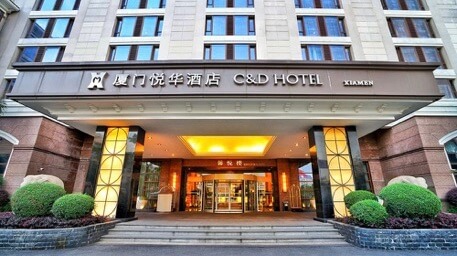
If you’re arriving at the Gaoqi International Airport, the luxury 5 star Xiamen C&D hotel is a short 10-minute drive away.
The rooms are equipped with every luxury item and feature that is to be expected from a luxury hotel. Comfortable spacious rooms are equipped with free WiFi and workstations throughout, which makes it easy to check emails or handle business whilst in the hotel.
The C&D offers more than one way to relax and unwind. The beautiful on-site ecological garden stretches an impressive 70,000 square meters. There are a number of walking paths that offer the chance of getting some fresh air and going for a long walk. There is also an indoor pool and gym available for all guests of the hotel.
The hotel’s Madame Rouge Western restaurant is one of the flagship restaurants of Xiamen. Known for its selection of French cuisine and high-end decor, it’s the perfect place to entertain and impress any clients or guests you might be welcoming for a business dinner.
Located in Xiamen’s island, the hotel is fairly central to all business districts, including the free trade zone along the coast.
There are several metro lines that run in the nearby vicinity of the hotel but none of which are accessible without a short walk. The best way to access the hotel and navigate the city’s streets is by using a reliable car service when you’re visiting on business or on vacation.
With over 500 reviews averaging a rating of 4.5 on TripAdvisor, it’s no wonder this luxury hotel is a popular choice amongst business travelers.

There is no point in denying it, air travel in China has its flaws. Although the government is investing heavily in the airports and transport networks dotted across major chinese cities, there is room for improvement. The impressive architecture of the country’s civil aviation sector doesn’t distract from many delays and sometimes poor customer service. Millions of local and expat travelers are often left feeling frustrated due to the last minute departure changes.
In a country as geographically vast as China, both experienced and first time visitors see no other choice than to put up with the stress that comes with the domestic air travel.
If you happen to be planning your trip across China soon, the following list shows all you should know about domestic flights in China.
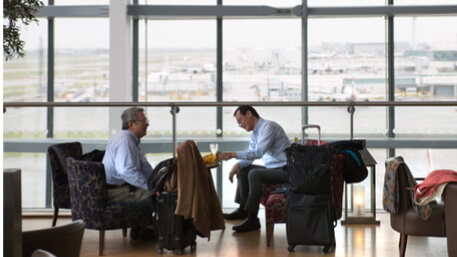
Business travelers who frequent the skyways of China are all too familiar with the delays that occur in airports across the country. Despite the improvements to business class lounges, the frustration of waiting around is hard to deny.
The reason why so many flights are delayed is often related to the Chinese military and the amount of airspace they control. With passenger airlines operating within such restricted routes, it is no wonder the crowded space leads to delays. Whilst it’s difficult to accurately quantify the impact China’s flight delays and cancellations have on the overall economy, a 2003 study by Li Xiaojin, a professor at the Civil Aviation University of China stated that if the military were to transfer just 10% of the airspace they control to passenger aircraft, it would boost China’s GDP by an incredible $32.6 billion!
Companies with employees regularly traveling domestically through China have started to equip their staff with 4G enabled cell phones to bypass the slow internet that often exists within Chinese airports. It is a necessary countermeasure against the loss in productivity that occurs when sitting in airports for hours on end. If you’re planning on flying from Beijing to Shanghai, for example, it’s best to prepare for any delays ahead of time. Remarkably less than 60% of domestic flights in China depart on time. Hangzhou airport amazingly sees only 42% of its flights depart on time, which is the second worst figure globally.
Due to the inevitable delay all passengers are likely to face with domestic flights in China, frequent travellers pack an extra set of clothes in their carry-on luggage. These come in handy in case of long delays that might require a stay in a hotel.
A private transfer is the safest, quickest way to travel from the airport to the city in China. China Car Service is a trusted transportation service helping business travelers for almost two decades. We provide door-to-door service at competitive prices.Make your journey stress-free and contact our 24/7 team at Bookings@ChinaCarService.com with questions, or get a quote below. Use this promo code: 10CARBLOG to get a $10 discount on your 1st service. |
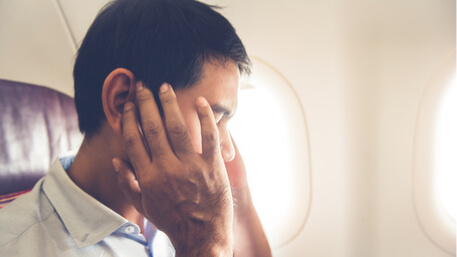
Delays are also common to occur while seated in the aircraft. The excuse is often said to be “air traffic control problems”. This leaves passengers waiting from a few minutes to a few hours, to depart. It is no wonder this kind of passenger treatment has resulted in many incidentes called “sky rage”. “Sky rage” is quite common to occur while flying on domestic flights in China, and it comes as no surprise to those travelling often. With many documented cases of passengers storming runways, starting riots inside aircraft, and opening the emergency doors of aircraft, it is no wonder some have opted to replace flying with train rides.
Business travelers making their way between major cities in China often decide to make use of the high-speed train networks as opposed to the local flights. The journey may be longer than a flight, but putting possible delays in consideration, a five-hour train trip between Beijing and Shanghai sounds a whole lot better.
If flying domestically ensure you have access to a business class lounge where you’re able to wait in comfort and most likely get some work done. Some of the better business class lounges even have showering facilities should you need to freshen up.

Air travel in China often means spending a fair amount of time in terminals and business class lounges of the major airports dotted across China. To ensure your waiting time is put to good use, it is recommended to have available online access at all times.
Although wifi is fairly available across China, the great firewall restricts access to popular social media sites as well as Google. Freely provided internet networks offer pedestrian internet speeds at best and the airports are no different.
A Chinese sim card can easily be arranged for those planning on getting some work done, or visiting any of the social media platforms. The sim card can be obtained even before arriving in China. Services like LoyoMobile, deliver the sim card to your door in the home country, before you depart. You’ll still need to install a VPN to bypass the internet restrictions China imposes on its networks. However, buying mobile data beforehand will ensure you’re able to be online and keep busy during the wait time.
Here are some additional tips to get familiar with domestic air travel in China.

For those accustomed to regular travel, it’s not unusual to have to deal with paperwork, health certificates, visa offices, and the endless checklists to fulfill when obtaining a visa. With China now comfortably placed as the world’s second-largest economy, it’s no wonder that millions of business travelers include China as one of their top destinations. If you’re one of these travelers, this is what you’ll need to know before you proceed with your visa application.
Most people are still likely to need a visa, so don’t go packing your bags and purchasing a ticket just yet! China allows for a number of exceptions, which deem visitors exempt from visa requirements, or applicable for a visa upon arrival. If you hold a passport from this select list of countries, you may not even need a visa:
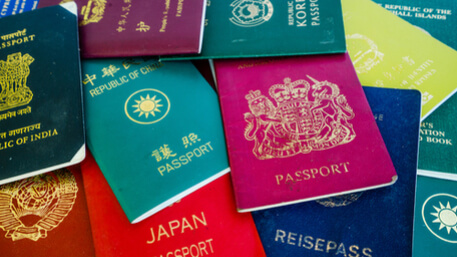 You may not require a visa if you’re in transit and:
You may not require a visa if you’re in transit and:
A private airport transfer is the safest, quickest way to get from the airport to your hotel. China Car Service is a trusted transportation service helping foreign business travelers for almost two decades. We provide door-to-door service at competitive prices.Make your journey stress-free and contact our 24/7 team at Bookings@ChinaCarService.com with questions, or get a quote below. Use this promo code: 10CARBLOG to get a $10 discount on your 1st service. |
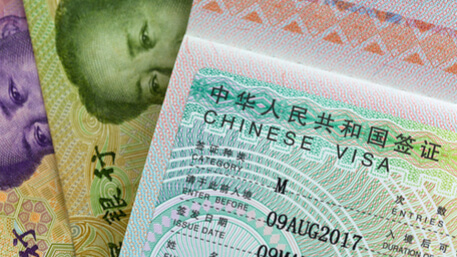 If you are not among countries with visa-free travel in China and need to pursue a China visa application ahead of your trip, it’s worth knowing there is more than one type of business visa available in China.
If you are not among countries with visa-free travel in China and need to pursue a China visa application ahead of your trip, it’s worth knowing there is more than one type of business visa available in China.
As one of the more regular business visas on offer, the F visa applies to individuals who are invited to China for non-commercial business exchanges, education events, science-related expeditions or medical visits. If you’re visiting China to attend the Canton Fair for example, or you’re inspecting factories and possible manufacturing sites for your goods, the F visa will apply. It’s important to remember that to qualify for an F visa, you’ll need to acquire an invitation from the business entity you’re visiting. If you’re visiting the Canton Fair you can apply for the invitation on their official website.
When travelling to China to conduct regular business or trades, this is the China visa application you need to pursue. With this visa you are not allowed to be employed or work for a company registered and operating in China, but it allows doing trade business.
If you plan on doing business in China and being paid by a company registered and operating within Chinese territory, you’ll need to get a long-term Z visa. China won’t grant this visa unless the company you’re working for is able to provide proof that you’re an expert in your field. If you’re found to be earning money in China without a valid Z visa, you are running a risk of being deported. The visa itself is only valid for 30 days, which means that when applying for it, it’s best to apply for a temporary residence permit that lasts 5 years under the same conditions.
If you’re planning on making use of China’s transit visa rules and bypass the need for a China visa application by staying for less than 72 hours, you’ll still need a valid passport, onward ticket to your next destination, a valid visa for your final destination and a fully completed arrival/departure card available at the airport. Once landing in China, to obtain your 72-hour transit visa do the following:
Tip: The visa application form can be downloaded and saved to your computer, where you can complete it and print it for submission. Be sure to complete every field, if you leave a section blank the application will be rejected and will need to be submitted again. If a certain field doesn’t apply to you, rather fill it with ‘N/A’. When printing, be sure to print and submit only single-sided pages, anything printed back to back will be rejected, as will any handwritten forms.
 Tip: There are many travellers who get their visas denied due to poor quality passport photos during the time of application. You’ll need to submit 2 full-faced passport style pictures with a white background for your application. Ensure the photos are clear, anything blurry or unclear will be rejected. It’s also essential that the pictures have been taken within the last 6 months.
Tip: There are many travellers who get their visas denied due to poor quality passport photos during the time of application. You’ll need to submit 2 full-faced passport style pictures with a white background for your application. Ensure the photos are clear, anything blurry or unclear will be rejected. It’s also essential that the pictures have been taken within the last 6 months.
Tip: With any China visa application for business, you’ll need to provide an original Letter of Duly Authorized Unit or Confirmation of Invitation issued by the relevant Chinese entity you’re planning on trading or meeting with. If your spouse or children are joining you for the trip, they’ll need to be included on the letter or invitation.
China has recently introduced a three-tier system for deeming the eligibility of foreigners when applying for business visas, based on their education, salary, age, language skill and time previously spent working in China.
 Tier A
Tier ACandidates who qualify for the top tier, by accumulating a visa score above 85 points, are able to receive paperless verification at borders, pre-entry visas and expedited approvals that encourage the highest qualifying foreigners to apply, live and work within China with ease.
Candidates who achieve a Hong Kong visa application score between 60-85 points are deemed to have professional skills that are required within the Chinese labour market at the time of application. The application itself is no easier than usual though, and is still a fairly controlled process.
The lowest tier of a candidate is for those who achieve a Hong Kong visa application score that is lower than 60. A number of visas granted for this category are limited each year, and are slightly difficult to achieve.
If you plan the journey which requires a transfer within China, select the most expeditious and comfortable way to travel with a reliable car service.
Now that you have all the necessary steps to obtain the right visa for your travel to China, here are a few useful things you might want to bring with you.

The history and culture of any place is often most visible in its local cuisine. Anyone who has visited Taipei (台北), Taiwan’s capital city, can attest to that. The city holds a wealth of global culinary influence that spans from Shanghai to Rome. It’s no wonder millions of travelers that make their way through Taipei each year enjoy their fair share of Taiwanese cuisine along the way!
Whether you’re visiting Taiwan to inspect your latest product’s manufacturing process or to entertain new clients, your evenings are bound to consist of meals with colleagues or clients. Our guide to the best restaurants in Taipei will prepare you for what’s in store when it’s time to grab a bite to eat!
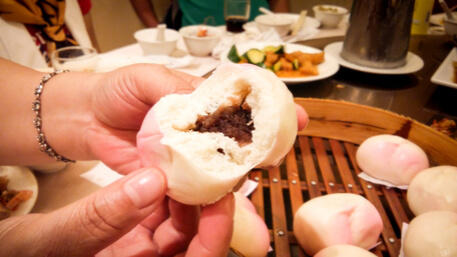 Raw
RawTaiwanese Chef Andre Chiang’s fine dining restaurant, RAW, was recently on the New York Times as one of the ‘10 restaurants worth a plane ride.’ If you’re looking to impress, the dedication these chefs put into this culinary experience will not disappoint. Head chef Andre Chiang names each of his dishes with their three primary ingredients. He uses a total of 24 ingredients on the menu, inspired by the 24 solar terms in the Lunar calendar.
The casual ambience and subtle decor is designed to keep diners free from distractions to wholly feel the explosion of flavors in every dish. Famous amongst locals, RAW is rated ⅘ stars on TripAdvisor.
Located high up in the famous Taipei 101 building, it holds a place on most Asian top dining lists. The Ding Xian Seafood Restaurant offers amazing views of the surrounding area (as amazing as the dishes loved by their visitors). Along with their high end a-la-carte items, diners are also offered specially designed set menus that are sure to wow business partners or colleagues. Consistently achieving 4 or more stars on Tripadvisor, Ding Xian sits high on the list of restaurants worth visiting during your stay in Taipei.
Rama Thai is situated atop the ATT 4 FUN, one of Taipei’s most popular malls. The luxury dining restaurant offers some of the best panoramic views in Taipei. Thai food is a popular choice throughout the region. However, the unique blend of Taiwanese flavors added to the experience at Rama Thai are unlike any you’ll find anywhere else. The Pad Thai, yellow curry, and chicken satay are the highlights for most visitors. If the delicious menu isn’t enough to convince you, the restaurant also offers a stunning outdoor pool with patio and seasonal bars that fill up during the summer months. Tripadvisor consistently rates Rama Thai 4 stars or higher. If you want to impress your guests, this is a fantastic option, it’s easily one of the best restaurants in Taipei.
Din Tai Fung is perhaps the most popular restaurant anywhere in Taiwan. With branches dotted throughout Taiwan, the flagship branch can be found near Yong Kang Jie in Taipei. Due to its popularity, you’ll generally be asked to wait up to 45 minutes before being seated, unless you make a booking ahead of time. The service is renowned and acclaimed for its excellence. A quick glance through the Din Tai Fung Tripadvisor page shows exactly why the restaurant is consistently rated above 4.5 stars. If you choose to visit Din Tai Fung, you’ll definitely want to try their famous soup dumplings and Taiwanese beef noodles!
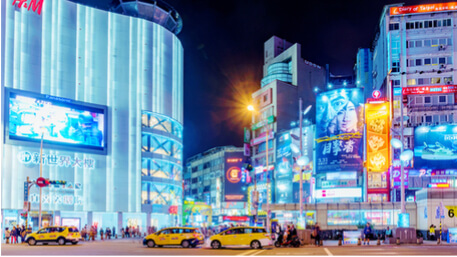 By Taxi
By TaxiOften, taking a taxi seems like the most logical and hassle-free option for most travelers. Unfortunately, in Taipei and China, it usually isn’t. One of the problems passengers immediately face is communication. If you’re unable to tell the driver where to go, or answer questions they may have, it can become very tedious. Unless you’re able to communicate in Mandarin and are familiar with the route, a taxi will be more complicated than you might expect. Language can be such a significant barrier to local drivers, that some refuse to pick up foreigners entirely, feeling it’s simply not worth the hassle.
Taipei’s metro system is one of the best you’ll find in Asia. Sprawling across most of the city, the metro system is signposted in both English and Mandarin. There’s also always metro staff located on the various platforms to assist you. Using the metro is not without its challenges, however. If you’re attending a high-end dinner with prospective clients or guests, you’ll likely prefer to avoid the queue and packed cabins at the end of a work day. Plus, a walk from the station to your chosen restaurant can be a challenge during the hot summer months.
Arranging a car with a driver gives you one less thing to worry about when traveling in Taipei. This door-to-door service is preferred by most business travelers in China as it’s a straightforward and efficient means of getting around in what otherwise can be a complicated and congested city. Regardless of what time your dinner finishes, you’ll have the comfort of traveling in a luxury private car. In this way, avoiding the stress of making connections on a train or find a cab driver willing to get you home safely.
 Explore The Night Markets
Explore The Night MarketsTaipei’s night markets are rooted deep in Taiwan’s culture. With a variety of local delicacies and bright shops lining the street, exploring the night markets of Taipei is a popular and easy way of getting to know the city. From Shilin Night Market in the north, with its maze of alleyways and vibrant energy, to the more traditional Raohe Street Night Market that features a temple lit up at night, you are more than spoiled for choice.
If walking through night markets doesn’t suit you, then taking a sip of the finer side of life in Taipei is worth exploring. Featured in Hayao Miyazaki’s feature film, Spirited Away, the quaint mountain suburb of JiuFen allows visitors to enjoy the local tea offerings, whilst surrounded by the mountains and city lights.
Visiting the hot springs is a popular pastime in Taipei and something you’ll often hear about from other visitors to the area. The mineral rich baths are believed to reduce stress and fatigue as well as boost the overall health of your skin. They’re located on the outskirts of northern Taipei and worth a visit if you’re looking to wind down after a busy day.
Have you dined in Taipei recently? Do you agree with our pick of the best restaurants in Taipei? What comments or advice would you be able to share? Feel free to leave your comments below!
If you find this blog useful, please feel free to share it!
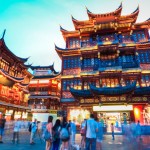
These days there is hardly any multinational company without some form of footprint in China. As the second largest economy on earth, it is evident why China is such an easy place to do business. From manufacturing most products seen in households and workplaces around the globe, to pioneering new technologies, China is the jack of all trades. As such, it is no wonder it attracts millions of business people each year to visit from all around the world. If you happen to be one of them and wish to be prepared for the visit we have put together this awesome list full of suggestions on things to pay attention to and to bring on your trip to China.
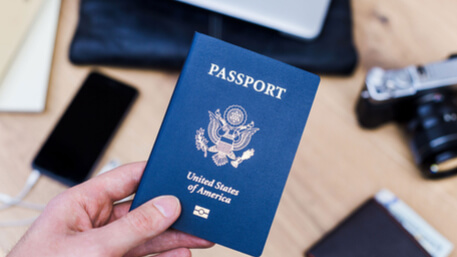
Pretty obvious right? A valid passport with a valid business visa seem like the first two things travelers would make sure to get. The truth is, however, that more than a few arrive in China to find out they have the wrong type of visa.
There are two types of business visas available when entering China. They are known as the “F” and the “M” visas. Both are fairly easy to arrange prior to your trip and knowing which one to obtain is based on the purpose of your visit.
The ‘F’ visas apply to those most likely attending a fair or a trade show, and those visits are referred to as non-business exchange or a non-commercial visit.
The “M” visas, on the other hand, apply to those visiting China to attend meetings, acquire new clients or to perform general trade.
Whilst the airport or border crossings are likely to be the only places you’ll need to show your ID/documentation, it is still good to carry scanned copies of your documents with you or have them on your tablet/mobile phone at all times.

Exchanging business cards is very popular in China, especially when it comes to doing business with foreign clients or business partners.
Chinese often adopt or translate their names from Chinese characters to English names when interacting with foreigners. The same should be done in return. So before your visit translate your details on one side of the business card to Mandarin. Doing so will make it easier for your Chinese counterparts to pronounce your name and details correctly and will leave little room for misunderstanding in who you are and what your business does.
Trust is an integral element in business relationships throughout China. Small signs of effort, like presenting a translated business card can go a long way and help improve or build a great relationship with your Chinese business partners.
Preparing for a trip to China? A private transfer is the safest, quickest way to travel from the airport to the city. China Car Service is a trusted transportation service helping business travelers for almost two decades. We provide door-to-door service at competitive prices.Make your journey stress-free and contact our 24/7 team at Bookings@ChinaCarService.com with questions, or get a quote below. Use this promo code: 10CARBLOG to get a $10 discount on your 1st service. |
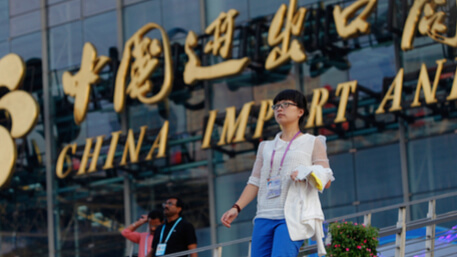
No, we’re not talking about the colour of your tie matching your socks to make a bold fashion statement your Chinese counterparts are sure to take note of. China’s business culture is rather conservative when it comes to dress code. If you’re meeting government officials or dealing with corporate clients, a suit is still generally the way to go.
On the other hand, if you find yourself in China attending a trade show or exploring factories or sites you’re thinking of doing business with in the future then a comfortable pair of jeans and sneakers will be a much better choice.
China’s climate is something to pay attention too before packing your bags. Most of the major cities like Hong Kong, Shenzhen, Beijing, and Shanghai tend to be very humid during the summer months, so carrying an extra shirt in your luggage is never a bad idea.

Even though apps are not something to bring or pack for your trip to China, it is essential to mention a few. There are many available apps that can make a trip to China easier and help avoid the “lost in translation” feeling.
Virtual Private Network (VPN): The great firewall of China is well documented, and unfortunately still very much in existence. Keeping up to date with emails on your Gmail account or posting updates on social media platforms like Facebook, Instagram or Twitter is not possible in China without using a VPN provider, which bypasses the firewall. Even with a VPN, the internet speed in China seems to be not as nearly as fast as in the West. Android phones are also particularly affected in China as most of their main functions are Google-driven. iPhones, on the other hand, don’t experience the same problem as the basic Apple apps such as Safari won’t be blocked in China.
WeChat: Originally a simple instant messaging service, WeChat has grown to be one of the most popular and used apps by millions of Chinese users. Available on both the Apple App Store and Google Play store, WeChat can be used to transfer files, translate messages, make instant payments, send live locations, video calling, instant messaging, and so much more. It’s an essential tool for doing business in China, as it is often the easiest and fastest method of communication between manufacturers, importers, and clients.
WayGo: Unless you’re fluent in Mandarin or Cantonese, chances are you’ll need some form of translation app on your smartphone when visiting China. One of the best translation apps on the market at the moment is probably WayGo. Available to both the iOS and Android markets, the app has been described as a piece of software engineering brilliance. WayGo is able to translate Chinese text to English in real time by using the camera on your smartphone. The best part is, that the app doesn’t need a steady internet connection to do so! The offline version is fully functional and extremely useful!

When you hear gifts, you’re probably thinking of what gifts you can bring home from your business trip to China.
Bringing gifts from your business trip in China is a great way to show your family and friends that you care and wish to share a part of the culture you have experienced during your travels with them. Often, doing the same when arriving to China can have the same effect. Manufacturers, clients and even corporate colleagues you are meeting with in China enjoy receiving gifts from your country and learn about your culture.
Gift giving is a big part of the Chinese culture, signifying a token of appreciation for the person you’re meeting. It’s worth doing some research on what your Chinese hosts may like to receive from your country. It doesn’t need to be expensive, the symbol is what counts.
If you find this blog useful, please feel free to share it! Have you been to China recently and could suggest more things to bring to China? Feel free to comment and share your experiences below!

Shenzhen is an incredible city. When you see the gleaming skyscrapers that occupy the skyline, it’s almost impossible to imagine that as recently as 1979, the city was nothing more than a quaint, quiet little fishing village. That all changed when Deng XiaoPing introduced one of China’s first (and most successful) ‘special economic zones.’ The transformation from a sleepy fishing village to a thriving metropolis has been swift, by any standard. So much so, that Shenzhen is regarded as one of the fastest growing cities on Earth! Those making their way to Hong Kong often find a reason to make the short hop across to Shenzhen, be it for business or pleasure. Doing so requires the relevant visas, of course. All visitors to Shenzhen entering from Hong Kong are subject to pass through China customs and immigration. Luckily, Shenzhen offers visas upon arrival at several border crossing points and getting one isn’t too complicated.
The process of getting a visa on arrival during a Shenzhen border crossing is fairly simple. All you need is a valid passport from one of the 25 pre-approved countries and enough RMB to pay for the visa. Before you book your trip from Hong Kong to Shenzhen, make sure your country is eligible for a visa upon arrival:
If your country is not on this list, you’ll need to arrange your Chinese visa prior to arriving in Shenzhen.
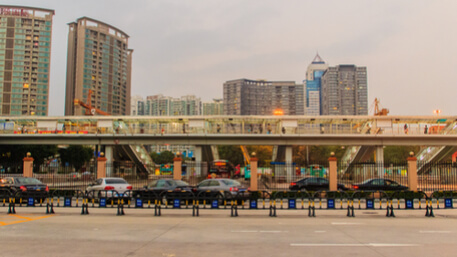
Luckily, there are several ways of getting between Hong Kong and Shenzhen. With more than one border crossing, you can choose the most convenient for you to get your visa.
Luohu Port: Open every day between 07:00 – 23:30, this is perhaps the oldest and one of the most frequented border crossings. Travelers passing through Luohu are able to get their hands on a free, very detailed map of Shenzhen, which can come in handy if it’s your first time.
Huanggang Port: The only port that operates for 24 hours a day, and by far the most popular with the locals. Most of Hong Kong’s bus and metro networks make their way to Huanggang, so getting to the port won’t be a challenge.
Shekou Port: Open between 07:00 – 22:00, those making use of the ferry services will probably arrive via the Shekou port.
Fuyong Port: Open every day between 10:00 – 17:30, located just 10 kms away from the Shenzhen Bao’an International Airport. If you need to be at Shenzhen’s airport, this is your best bet.
The signposts on all border crossings should offer English labels that are fairly easy to navigate. Upon your arrival, look out for the ‘China Customs’ signposts and head in its direction. On your way to the customs counters, keep an eye out for the ‘Foreigners’ signposts and the subsequent ‘Port Visa’ signs for the relevant counter to obtain your visa.
A private transfer is the safest, quickest way to get from Hong Kong to Shenzhen. China Car Service is a trusted transportation service helping business travelers to China for almost two decades. We provide door-to-door service at competitive prices.Make your journey stress-free and contact our 24/7 team at Bookings@ChinaCarService.com with questions, or get a quote below. Use this promo code: 10CARBLOG to get a $10 discount on your 1st service. |
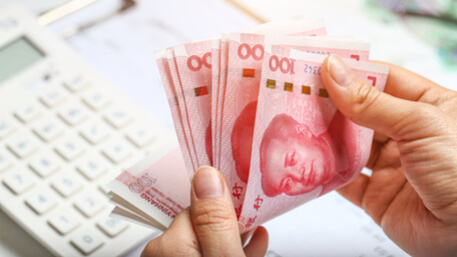
The standard fee for most eligible visitors is 168 RMB (24 USD). If you’re a U.K or U.S passport holder, the price is significantly higher at 314 RMB (38 GBP) for British travelers and 956 RMB (137 USD) for Americans. If you do happen to hold a British or American passport, we recommend you apply for the 10-year visa, as the Shenzhen border crossings offer this option at the same price as a short stay visa.
Though some border crossings accept credit cards, not all do. It’s best to carry enough RMB with you, just in case. If you don’t find time or a way to obtain RMB on your way to the border, there are a number of currency exchange kiosks that will exchange foreign notes for RMB fairly quickly. However, as is expected, their exchange rate will benefit them a lot more than you. This is why we highly recommend taking care of this before your arrival, if possible.
The actual application process is pain-free and rather simple. Filling out the standard form, providing a passport photo (which can be taken at the border crossing for a small fee), and paying the visa fee. Depending on how busy the counters are, the process generally doesn’t take longer than 30 – 40 minutes. Make sure your passport has enough space for the visa, it’ll take up an entire page. All of the borders should have English-speaking staff that will be happy to help during the application process.

Getting anywhere in China can be a challenge, especially when dealing with crowded public transport terminals. If time is a priority for you, then booking an expedient private car service between Hong Kong and Shenzhen will allow you to pass seamlessly through the Shenzhen border crossing.
A private car service allows for a convenient border crossing. You’ll even be able to get work done throughout your journey and cross the Hong Kong side of the border in the comfort of your vehicle.
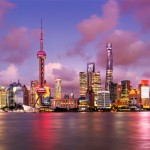
Shanghai is positioned as one of East Asia’s leading business cities, as well as a popular travel destination. It is home to Asia’s most impressive array of skyscrapers, among which is also the world’s second tallest tower. Along the Huangpu River stretches the worldwide famous waterfront promenade, called “The Bund”. The stroll down the Bund offers a futuristic geometry of Shanghai’s skyline showcasing an incredible collection of the most powerful banks and trading houses.
With over 23 million residents now calling it home, the local economy is thriving, drawing millions of business travellers within its city limits each year.
If you are planning a business trip to Shanghai soon, here is our Shanghai city guide for business travelers:
With China’s first ever Free Trade Zone (FTZ) located not far from the airport in Pudong, it’s no wonder so many international businesses within Shanghai are thriving. As a gateway to the broader Chinese markets, Shanghai has established itself as a hub for business travellers, and with those using it as a transfer point when reaching nearby cities along the Yangtze River Delta. It comes as no surprise that Shanghai boasts two major international airports, which are amongst the busiest airports in the world.
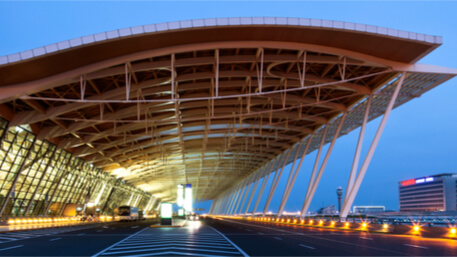
hanghai has two major airports for visitors to choose from. Shanghai Pudong International Airport opened its doors in 1999 and has since become one of the world’s biggest and busiest airports. If you’re making your way to Shanghai from a western city, it’s more than likely you’ll be landing at Pudong. Situated just 30 km’s outside of the city centre, getting to the airport is very simple using any of the following options:
Shanghai is home to the world renowned Maglev high-speed bullet train. Gliding along the magnetic tracks at a remarkable 431 km/h, it’s really worth trying it if you are visiting for the first time. If you find the metro to be closer, take the Line 2 of Shanghai’s metro which runs directly to the airport every 8 minutes or so between 6:00 and 22:00 each day. Shanghai, as most big cities, has its peak hours where the crowds tend to be unbearable. Mind the rush hour times to avoid being caught in the long lines of people trying to push their way through the crowd to catch a ride. Another great alternative is having a pre-ordered car waiting for you.
To most western travellers, calling a cab and making their way around seems to be the easiest option. However, that’s not the case in China. As in many places around the world, China’s taxi network is also known to have unlicensed drivers looking to scam unsuspecting foreign travelers. Driving off with your luggage, unregulated meters, and fake bills are some of the common scams that many visitors experience. Even the licensed and legal taxi drivers often simply refuse to pick up foreigners in Shanghai, citing the language barrier as far too great an obstacle to overcome. The trip from the city centre to the airport is just under an hour. However, most business travelers opt for a different and safer method of transport in order to avoid the potentially unpleasant cab ride experience.
Using a professional car service is by far the most expeditious and comfortable way to travel.
The roads in China often times tend to be chaotic. With a reliable car service you will have a driver who speaks English fluently, your pick up times will be guaranteed, and your luggage will be safely stored in the vehicle. You won’t need to concern yourself with any of the stress or hassle often associated with traveling through China.
Private car service is the only transportation option that allows you to relax from the airport to your final destination. If you’ve just had a long international flight and have a busy work schedule ahead, this is definitely a great transportation solution for you.

Considering Pudong FTZ draws the majority of business visitors each year, it’s by far the best area to stay in. Shanghai’s industrial and financial zones are located in Pudong, meaning you’ll be able to meet a manufacturer or investor within short distances of your hotel. If you’re in need of a hotel suggestion the three top recommended hotels are:
One of the luxury hotels hidden among many skyscrapers in Shanghai city is the Ritz-Carlton Pudong. Occupying the top 18 floors of the impressive, high-end IFC shopping centre, you’ll be able to experience the luxury on offer from the second you step into the elevators. Wrapped in ruby red, exotic stingray skins, the elevators are a small glimpse into the luxury that awaits within the rest of the hotel. Not to mention you’ll be close to the central business districts, in one of the world’s finest hotels.
Despite its location in the heart of Jing’an the 229 luxurious rooms and suites on offer at the Puli resemble an oasis of sorts. The contemporary design lead by traces of dark wood and sliding silk screens complemented by subtle Chinese accents like Han dynasty sculptures and terracotta statues. If your day is booked back to back with meetings, the Puli is the perfect choice for your trip to Shanghai.
On the banks of the Huangpu within walking district of the Lujiazui is the Mandarin Oriental. This hotel is very popular among business travellers looking to stay close to the office. The sleek, stylish and modern design tends to blend in perfectly with the surrounding skyscrapers occupying the Shanghai skyline. If your stay has been particularly stressful, the Oriental offers one of the best spa packages in Shanghai, not to mention the luxurious comfort the rooms provide!
If you happen to have some extra time during your stay and are looking to take in some of the sights and sounds of Shanghai after you’re done with your meetings then it makes sense to stay in the historic centre of Shanghai, Puxi. Filled with beautiful, traditional Chinese architecture and cultures, you’ll have access to all kinds of shopping, dining and cultural activities to keep yourself busy with.
Preparing for a trip east and ready to enjoy visa-free travel in China? A private transfer is the safest, quickest way to travel from the airport to the city. China Car Service is a trusted transportation service helping business travelers for almost two decades. We provide door-to-door service at competitive prices.Make your journey stress-free and contact our 24/7 team at Bookings@ChinaCarService.com with questions, or get a quote below. Use this promo code: 10CARBLOG to get a $10 discount on your 1st service. |

Over the years Shanghai has developed a wide range of restaurants offering a five-star dining experience.
In 2017, Shanghai got its own Michelin dining guide, boasting some of Asia’s finest and most exciting restaurants. Among plenty of dishes on offer the traditional favourites are dim sum and xiaolongbao done superbly well across the city.
Food is the epicentre of Shanghai social life. Whether it’s friends gathering to share a meal, or a business meeting taking place, those who visit Shanghai often will agree that experiencing Shanghai’s cuisine is the best way to truly understand the city.
The best places to impress your clients or prospective business partners are located along the Huangpu river promenade. It’s a favourite spot for business travellers looking to unwind after a busy day, and to absorb the impressive sights and sounds of the city at night. Some of the best spots surely are:
If you’re looking for something special to experience during your stay in Shanghai, then Paul Pairet’s masterpiece, the Ultraviolet is where you need to be. Situated in the ever popular waterfront area of Shanghai’s “Bund” district, it offers an experience unlike any other. With meals consisting of 20 courses, each bringing a different sensory mood, this is definitely the place that leaves its each visitor impressed.
Shanghai still maintains an element of ancient charm, and Fu 1039 captures it perfectly. Hiding within an extravagant 1913 villa, the Shanghainese food is exemplary. With the sophisticated decor on par with popular dishes like the drunken chicken and sweet and sour mandarin fish, you’re not going to leave the Fu disappointed. It’s worth noting there’s a minimum charge of ¥225 per person and the staff aren’t that familiar with English but it serves to enhance the experience.
If you’re looking to take your team or clients to a more relaxed place, then this is where you should be! Adored by locals and expats alike, for their renowned Húnán-style cumin-crusted ribs, and the excellent Húnán-style fried crab in a clay pot or even the classic boiled frog, you’re bound to unwind and enjoy this Shanghai staple.
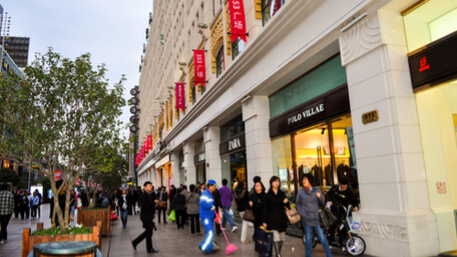
Shanghai has many places for travellers to experience, and offers enough to keep any traveller busy if they choose to visit any of the exciting new art galleries, nightlife and theatres in the city. A favourite amongst visitors is to follow the cultural route and enjoy the Chinese opera scene thriving in the city.
If the creative arts is not to your taste, Shanghai boasts an impressive shopping scene too. Considering that Chinese buyers account for as much as 46% of the global luxury goods market, shopping in Shanghai can be quite an experience. Brands like Gucci, Burberry and high-end fashion boutiques are common in Shanghai, and are offering everything from antiques to Tibetan jewellery. If you’re hoping to find a gift to bring home for a loved one, it’s hard not to find what you’re looking for within Shanghai’s shopping districts. For more gift ideas check here.

Shanghai is not exempt from China’s ‘great firewall’. To use any of your day-to-day apps like Gmail, Facebook and many other western social media platforms, you’ll need to download a VPN provider. Once you’ve set up your VPN, you’ll be able to browse all your favourite platforms as usual.
Some useful Chinese apps used by locals daily include payment apps like Alipay and Wechat. The later being immensely popular in China for a variety of its useful features. Doing business in China is often hard without a weChat account.
Another thing worth remembering is that if you plan to use Skype for business while in Shanghai, download the app before hand. Doing so anywhere in mainland China will redirect you to a Chinese version, which allegedly results in having your calls and messages monitored.
Shanghai is known as China’s most westernized city, and is popular among many visitors from all around the world. It offers a world class nightlife, architecture and above all business opportunities. If you’re considering visiting Shanghai soon, we highly recommend you do.